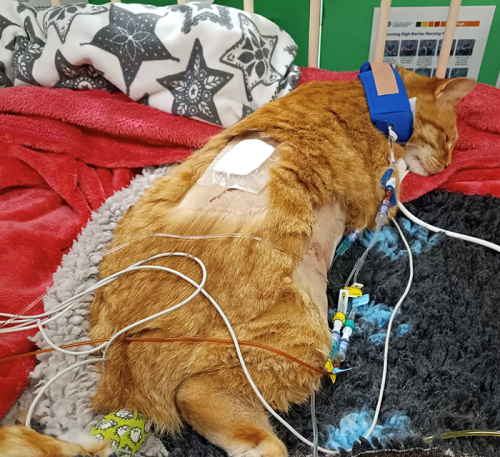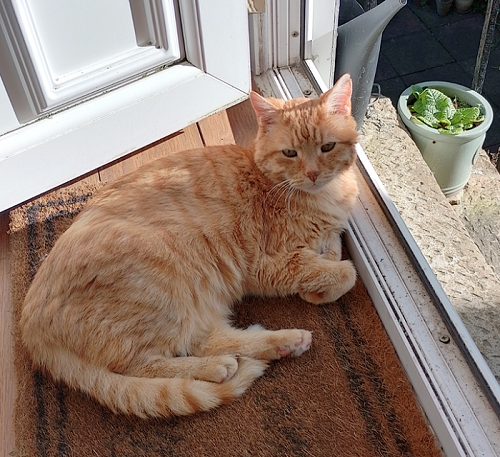Teams work together to save cat following dog attack
Specialist vet and nursing teams successfully treat cat with life-threatening injuries.
Veterinary Specialists from the Royal (Dick) School of Veterinary Studies Hospital for Small Animals have worked collaboratively to repair multiple injuries in a critically ill cat.
In addition to attending to a lower spine fracture and spinal cord injury, the team repaired the cat’s multiple abdominal wounds, including a detached kidney, during emergency surgery.
Following specialist nursing, the cat was discharged 10 days later and has made a full recovery.
Emergency referral

Gingy, an 11-year-old male cat, was referred to the Hospital for Small Animals as an emergency case following a dog attack. He was in severe pain with several deep puncture wounds on his abdomen and back. He also had weakness in his hind legs.
The Hospital’s Neurology and Emergency and Critical Care (ECC) teams worked together to assess Gingy’s injuries. The Diagnostic Imaging team conducted an emergency trauma CT scan, which identified that a bone in Gingy’s lower back had been fractured and that his spinal cord was compressed.
Internal injuries
Due to the location of some of the bite wounds, and the damage to the cat’s abdominal wall, surgeons from the Soft Tissue Surgery Team performed exploratory surgery to check if any of his major organs had been damaged.
They found that Gingy’s right kidney had been detached from his abdominal wall, a rare and serious trauma to the organ, as a result of the attack. They were able to surgically replace the kidney to its normal position and repair Gingy’s wounds and damaged tissues.
Further complications
Following surgery, Gingy required 24-hour monitoring by the Hospital’s ECC vet and nursing team. He also received a tailored pain relief plan developed by the Anaesthesia team.

Widespread muscle damage resulted in a severe build-up of fluid in Gingy’s body and a drop in his blood pressure that needed to be addressed. His damaged kidney also made managing his fluid and medication needs challenging, requiring specialist input to ensure he was able to get through the post-operative period.
The team decided against further surgery to repair Gingy’s spinal fracture, instead prescribing anti-inflammatory medication and, when he had recovered from surgery, a physiotherapy programme from the Royal (Dick) Edinburgh Physiotherapy Assessment and Intensive Rehabilitation (REPAIR) Centre to help him regain his mobility.
Specialist care
Gingy made a steady recovery and was discharged 10 days after surgery. His owners report that he is doing well and has good kidney function and mobility.
The Hospital for Small Animals has 40 Royal College of Veterinary Surgeons (RCVS) Specialists working across its 15 referral services. They, along with the extensive clinical and nursing staff, many with specialist qualifications, ensure that the thousands of patients who are referred to us every year receive the highest level of veterinary care.
We are delighted that Gingy is doing so well. His recovery is a huge testament to Gingy himself, as well as his family’s dedication. We’re very lucky to have a multi-disciplinary team at the Hospital, that work together to ensure that complex cases like Gingy get the benefit of everyone’s expertise. Our nursing team also do an incredible job to ensure that pets like Gingy are cared for and supported whilst away from their families.
About the Royal (Dick) School of Veterinary Studies
The Royal (Dick) School of Veterinary Studies is a one-of-a-kind centre of excellence in clinical activity, teaching and research. Our purpose-built campus, set against the backdrop of the beautiful Pentland Hills Regional Park, is home to more than 800 staff and almost 1400 students, all of whom contribute to our exceptional community ethos.
The School comprises:
The Global Academy of Agriculture and Food Systems
The Hospital for Small Animals
The Jeanne Marchig International Centre for Animal Welfare Education
We represent the largest concentration of animal science-related expertise in Europe, impacting local, regional, national and international communities in terms of economic growth, the provision of clinical services and the advancement of scientific knowledge.

